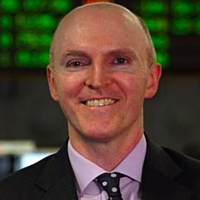What you need to know from markets this week

Westpac Bank
Fed Chair Powell appears open to a slower pace of monetary tightening and equity markets like it. Back in October, Fed Chair Powell had suggested that “we're a long way from neutral at this point” – neutral interest rates being the point where monetary policy is neither helping nor hindering the economy.
That much more hawkish tone from the Fed chair helped send US bonds sharply lower with 10yr yields pushing above 3.2% early October and, combined with trade war concerns, equity markets into a tailspin which saw the S&P500 drop more than 10% from peak to trough through the month.
Now the merest hint at the Economic Club of New York Thursday that we are “just below the broad range of estimates of the level that would be neutral for the economy” was enough to spark a strong bounce in the S&P500, and US bond yields briefly dipped below 3% for the first time since mid-September.
To be sure, the Fed and many private sector economists “are forecasting continued solid growth, low unemployment, and inflation near 2%” so it’s clearly the case that rates will continue rising at a gradual pace.
Westpac is forecasting rates will rise in December, and this will be followed by further rate hikes in March, June and September too. However, market pricing now suggests that the Fed will hike in December and only once more after that suggesting traders are expecting a very benign outcome from the Fed indeed.
With the Fed Chair speech out the way, attention now turns to the key G20 meeting in Buenos Aires this weekend. Expectations are high that Trump and Xi will emerge with some sort of agreement on trade from a private dinner scheduled for Saturday evening.
However, positioning from the US administration has been very unsupportive for this view. The US Trade Representative released a 55 page report last week detailing how China "appears to have taken further unreasonable actions in recent months" and this week announced fresh moves to “examine all available tools to equalize the tariffs applied to automobiles” by China.
This investigation is over and above the Commerce Department section 232 auto investigation that was launched in May of this year, with final report due in March next year at the latest.
The USTR move represents an escalation of trade actions ahead of G20 and is a clear indication of how high the bar is set for any trade agreement to be possible.
Despite this, the more upbeat tone for equity markets, lower US yields, softer US$ and much improved tone in emerging markets has helped the A$ to a 3 month high in the last few days. This move has been despite a sharp fall in iron ore prices to 4 month lows to just below $65. Westpac is not forecasting this strength to last too much longer, with a drop to 0.72 by year end and 0.70 by mid next year.
Now next week brings a heavy run of data and risk events. We have inventory data for Q3 on Monday – an important input Q3 GDP; Tuesday sees the RBA policy meet where policy will of course be unchanged but commentary on housing will be closely watched; Wednesday brings Q3 GDP where Westpac expects to see 0.7% on the quarter/ 3.4% on the year with some downside risks due to softer construction work done data and then Thursday merchandise trade plus retail sales.
It’s busy around the world too. The US ISM, a key gauge of U.S. manufacturing , will be released Monday; Fed Chair Powell testifies on the economic outlook before Congress’s Joint Economic Committee Wednesday and the key US non-farm payrolls report is released next Friday.
OPEC meets in Vienna Thursday with crude prices down 33% from the early October highs; and a series of Brexit debates are scheduled in the House of Commons from Tuesday as May faces her biggest challenge, the ‘meaningful vote’ December 11.
These are all factors we will talk about in next week’s markets update.

Sean Callow is Westpac Bank's Senior Currency Strategist, based in Sydney. Sean focuses on the Australian dollar and other G10 and Asian currencies. He has worked in strategy and economics roles in New York, London, Singapore and Melbourne.
Expertise

Sean Callow is Westpac Bank's Senior Currency Strategist, based in Sydney. Sean focuses on the Australian dollar and other G10 and Asian currencies. He has worked in strategy and economics roles in New York, London, Singapore and Melbourne.

